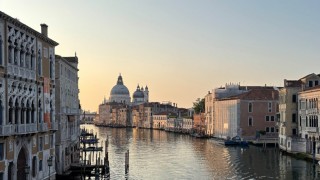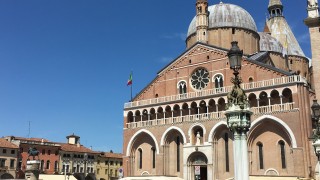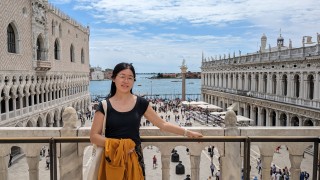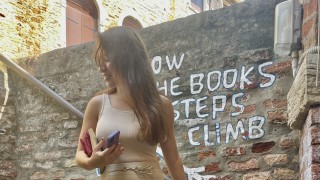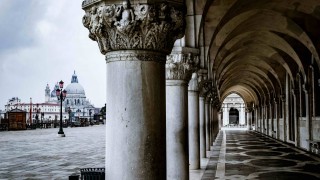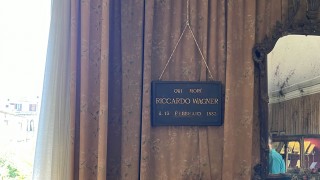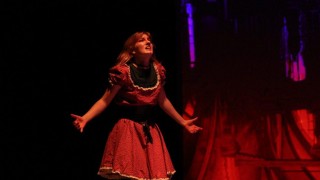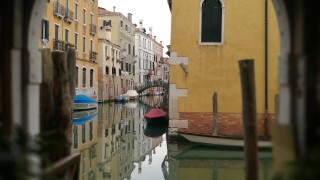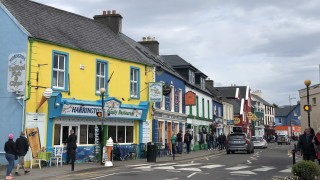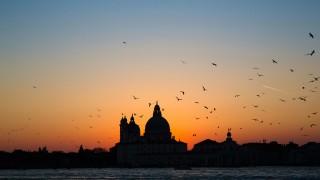Immerse yourself in the culture, history and language of La Serenissima on a six-week summer program in Venice. Choose from a menu of courses in Italian language, culture, film, music and art history. Experience the rich contemporary and historical culture of Venice, while also making rapid progress towards your academic goals.
We will hold a virtual info session for the program on Monday January 26th from 12-1pm. Please register here to attend and/or receive the recording afterwards.
For more information, please view the recording of our December 2025 Information Session:
Program Overview
Students learn about the art, literature, music, culture, and society of Venice and the Veneto region while also having the option to study and practice Italian. The program is not geared toward any particular major, and students with no Italian language or art history background are eligible to apply.
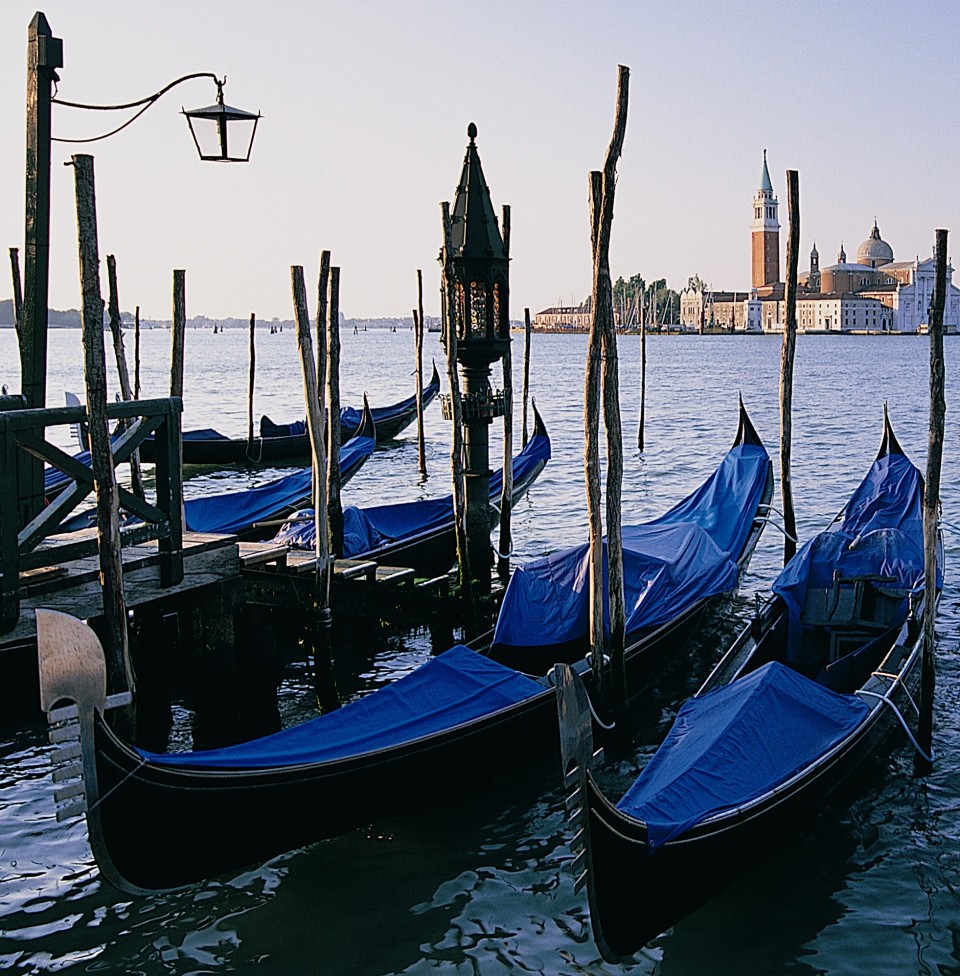
- The program offers different courses from which to choose, with total point options ranging from 6-9 points for the summer
- All students are required to enroll in a a minimum of 6 points
Course combinations will provide opportunities to deepen the appreciation of Venetian visual culture, to rapidly improve Italian language skills, or to learn more about Italian culture through history, film and literature.
Eligibility and Application
Currently enrolled undergraduate and graduate students in good academic and disciplinary standing
Minimum 3.0 cumulative GPA. Students must also maintain a 3.0 GPA during the semester before going abroad.
Minimum 3.0 average language GPA for courses taught in Italian
Students must meet prerequisites for individual courses
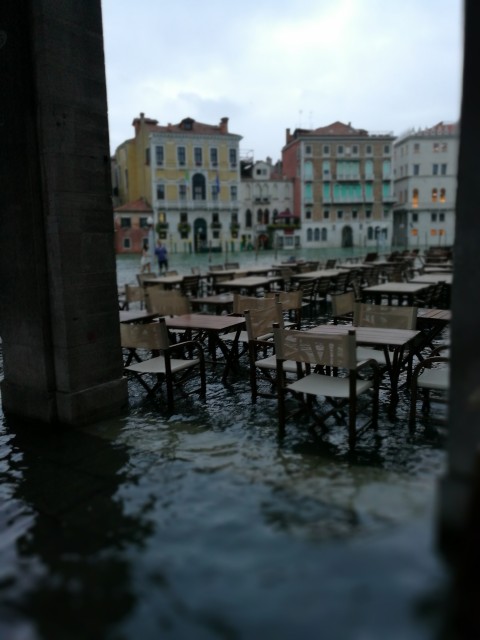
How to Apply
Want to apply? Click the “Apply Now” button above. If the button doesn't appear above, the program is not yet accepting applications. You will be asked to set up a short profile, which will allow us to send you relevant information about your application. Once you’ve created a profile, you will see a checklist of items that you will need to submit. These generally include:
- Application questionnaire(s)
- Letter(s) of recommendation
- Home school approval/clearance: If applying from another university, please check with your home university's study abroad office about applying for permission to attend the program and to transfer the credit
I never expected to fall in love with Venice the way that I did, and I am already trying to find a way to go back.
-Hannah Loughlin, CC'20
Academics
Note: The University reserves the right to withdraw or modify the courses of instruction or to change the instructors as may become necessary.
Participants choose their courses according to personal aspirations and interests as well as the course schedule. All students must enroll in a minimum of 6 points.
Please note that the course offerings and schedule are still subject to change. Attendance at all class meetings, concerts, and excursions, unless otherwise indicated, is mandatory.
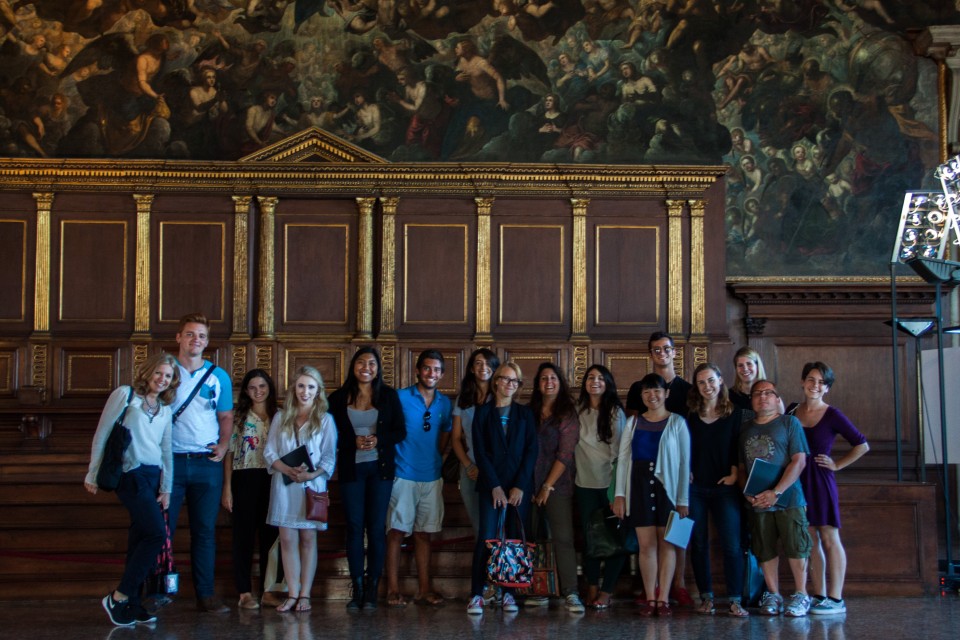
Language Courses (Summer 2026)
Italian [In Venice] O1121. Intensive Elementary Italian. 6 points
Prerequisites: None
Instructor: TBD
![]() Syllabus - Intensive Elementary
Syllabus - Intensive Elementary
The equivalent of Italian 1101/1102 at Columbia. This intensive first year course, open to students with no previous training in Italian, prepares students to move into intermediate Italian.
The course provides students with a foundation in the four language skills of listening, speaking, reading and writing. Students are encouraged to participate actively in class discussions and activities and to interact with teacher and classmates. We will learn Italian not only thanks to exercises and conversation, but also through songs, clips, pictures, food, and games. Upon successful completion of the course, students should be able to:
provide basic information in Italian about themselves, their interests, their daily activities;
participate in a conversation on everyday topics using the major time frames of present and past;
read short edited texts, understand the main ideas, and pick out important information from authentic texts (e.g. menus, signs, train schedules, etc.)
write short compositions on familiar topics;
identify basic cultural rituals and practices in the context of their occurrence.
Please note: If you have completed Elementary 1, you are welcome to enroll in the Intensive Elementary course. You will be expected to enroll in the full 6 point course. While there will be some overlap in the coursework that you already completed at Columbia, it will benefit you to be in Venice to reinforce and enhance your language studies before continuing on to new material. Upon successful completion of the course, you will be awarded 4 points for the Intensive course.
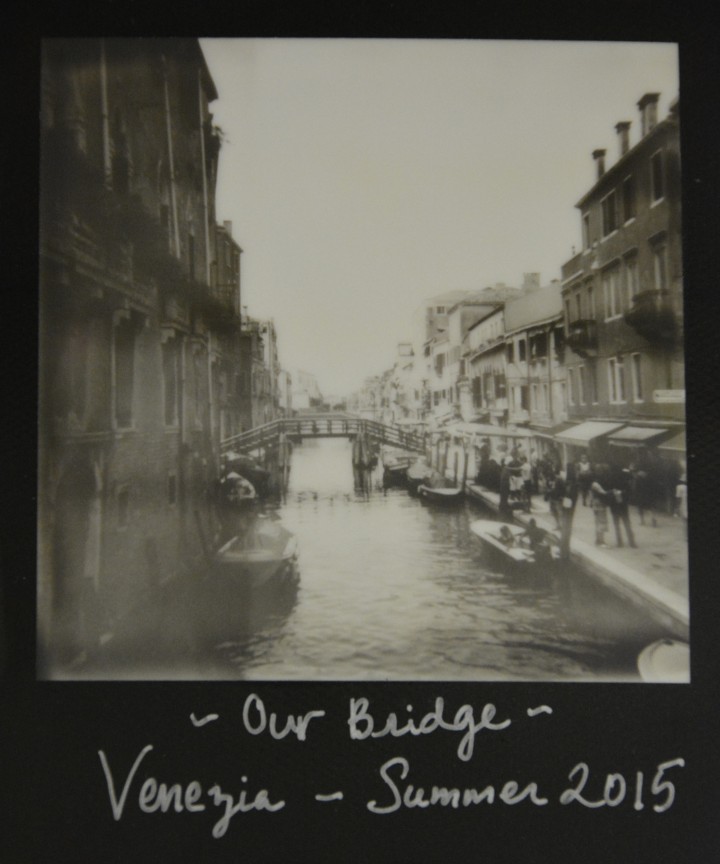
Italian [In Venice] O1203. Intensive Intermediate Italian. 6 points
Prerequisites: One year of college-level Italian or the equivalent.
Instructor: TBD
![]() Syllabus - Intensive Intermediate
Syllabus - Intensive Intermediate
The equivalent of Italian 1201/1202. This intensive second year course allows students to develop listening, speaking, reading, and writing skills in Italian and a better understanding of Italian culture.
Students are involved in activities outside the classroom, where they gather information on Italian cultural topics through interviews and surveys that allow them to engage directly with the local community. Upon successful completion of this course, students should be able to:
use a sufficient range of language to be able to give clear description;
express viewpoints on most general topics;
show a relatively high degree of grammatical control;
use cohesive devices to link their utterances into clear and coherent discourse;
give detailed descriptions and presentations on a wide range of subjects related to their fields of interest, expanding and supporting their ideas;
write clear and detailed text on a variety of subjects related to their field of interest, synthesizing and evaluating information and arguments;
understand straightforward factual information about common everyday life;
interact with a degree of fluency and spontaneity that makes for regular interaction;
express news and views effectively in writing, and relate to those of others;
express themselves appropriately in different cultural and communicative situations;
and be aware of the most significant differences between the customs, usages, attitudes, values, and beliefs prevalent in the Italian culture and those of their own.
Please note: If you have completed Intensive 1, you are welcome to enroll in the Intensive Intermediate course. You will be expected to enroll in the full 6 point course. While there will be some overlap in the coursework that you already completed at Columbia, it will benefit you to be in Venice to reinforce and enhance your language studies before continuing on to new material. Upon successful completion of the course, you will be awarded 4 points for the Intensive course.
ITALIAN Art history & CULTURE COURSES (SUMMER 2026)
CLIA OC4600: Mediterranean Humanities II in Venice
Prerequisite: None. Mediterranean Humanities I is not a requirement to enroll in this course.
Instructor: Konstantina Zanou
What is the Mediterranean and how was it constructed and canonized as a space of civilization? A highly multicultural, multilingual area whose people represent a broad array of religious, ethnic, social and political difference, the Mediterranean has been seen as the cradle of western civilization, but also as a dividing border and a unifying confluence zone, as a sea of pleasure and a sea of death. The course aims to enhance students’ understanding of the multiple ways this body of water has been imagined by the people who lived or traveled across its shores. By exploring major works of theory, literature and cinema since 1800, it encourages students to engage critically with a number of questions (nationalism vs cosmopolitanism, South/North and East/West divides, tourism, exile and migration, colonialism and orientalism, borders and divided societies) and to ‘read’ the sea through different viewpoints. In the final analysis, Med Hum II is meant to arouse the question of what it means to stand on watery grounds and to view the world through a constantly shifting lens. The Summer version of the course is adapted to contain more material on Venice and its Mediterranean surroundings.
This course fulfills the Global Core requirement and the requirements of Columbia's Italian major and Mediterranean Studies minor. For Global Core, please note students may only receive Global Core credit for either CLIA GU4500 or CLIA OC4600; not both.
Art History O4430. Art in Venice. 3 points.
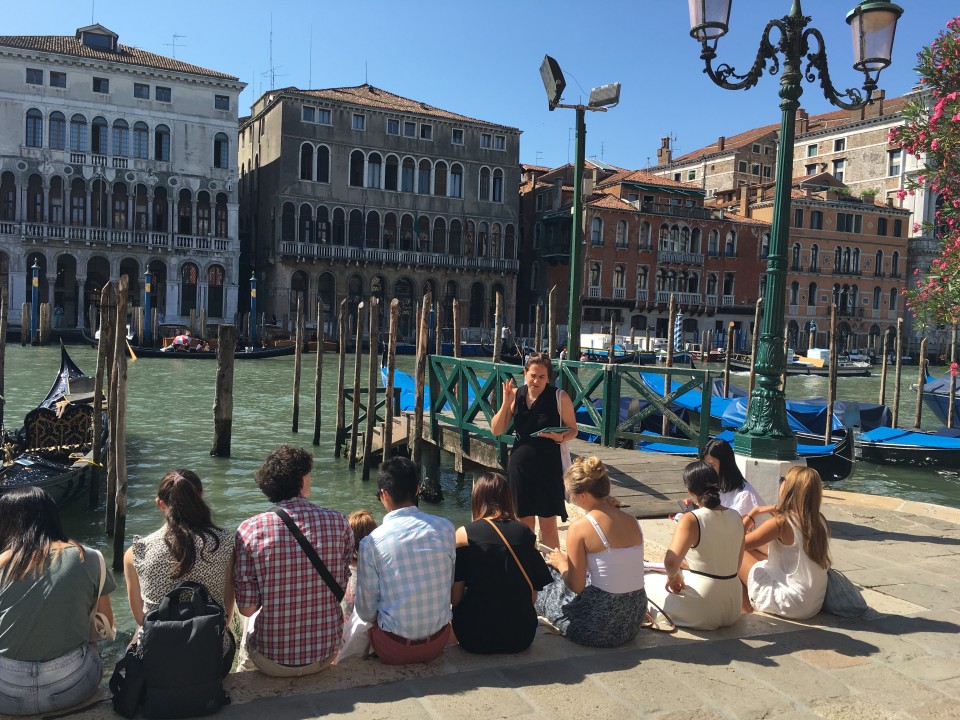
Prerequisites: None
Instructor: Johanna Fassl
This course examines the art, architecture, and culture of Venice from the 14th to the 18th century. The goal of the curriculum is for students to acquire a firm visual literacy in order to read works of Venetian art and to familiarize themselves with the methods of art history. The course is set up as a field study, using the city as classroom and supporting site visits in and outside of Venice. The goal is to provide students with a solid visual knowledge and historical understanding of a set of key monuments, and to encourage them to think through the social, political, cultural, and intellectual forces at play in the creation of these works. Each day's choice of monuments is based on a walkable itinerary, visiting churches, confraternities, cloisters, palaces, and museums. Day trips include excursions to Padua and the Palladian villas in Vicenza and the Veneto.
Counts toward the Art History Major/Concentration at Columbia.
AHIS OC3431 Contemporary Art at the Venice Biennale. 3 points.
Prerequisites: None
Instructor: Julia Bryan-Wilson
This course introduces the relationship between contemporary artistic practices and the Venice Biennale. The Biennale has become one of the most important international contemporary art fairs. This course will expose students to the historical, political, and cultural developments linked to the biennale from its inception in 1895 to present day. In addition to regular class meetings with slide lectures and seminar-style discussion in the classroom, students will visit exhibition spaces located in the historical pavilions of the giardini (fair gardens), the arsenale (a 16th century warehouse space now used to host sections of this contemporary art installations), and other temporary venues located throughout the city as we investigate not only the art, but also the unique spaces in which we encounter it. Beyond a focus on the history of the Venice Biennale, the course will introduce some of the key concepts of contemporary art as they have developed in the past three or so decades.
Counts toward the Art History Major/Concentration at Columbia.
Art History O4432. Introduction to the Conservation of Venice's Built Heritage. 3 points.
Prerequisites: None
Instructor: Mieke van Molle
This course offers the unique opportunity to study the buildings, statues, and the built environment of Venice, and the challenges of conservation these structures face. In this course, students are introduced to historical construction techniques and building materials through case studies of specific buildings and sculptures, and will then focus on the conservation of these structures. Questions of sustainability, historic preservation, and conservation at the intersection of art and science lie at the center of this course which will take you to historic buildings and active conservation sites.
Counts as a seminar for the Art History Major/Concentration at Columbia.
Past Courses
AHIS OC3431 Contemporary Art and Architecture at the Venice Biennale. 3 points.
Prerequisites: None
Instructor: Alexander Alberro
This seminar introduces the relationship between contemporary artistic and architectural practices and the Venice Biennale. The Biennale has become one of the most important international contemporary art and architecture fairs. This course will expose students to the historical, political, and cultural developments linked to the biennale from its inception in 1895 to the present day. In addition to regular class meetings with slide lectures and seminar-style discussion in the classroom, students will visit exhibition spaces located in the historical pavilions of the Giardini (fair gardens), the Arsenale (a sixteenth-century warehouse space now used to host sections of this contemporary art and architecture biennale), and other temporary venues located throughout the city as we investigate not only the art and architectural displays but also the unique spaces in which we encounter them. Beyond focusing on the history of the Venice Biennale, the course will introduce some of the key concepts of contemporary art and architecture as they have developed in the past three or so decades.
Counts toward the Art History Major/Concentration at Columbia
MUSI4135GU Opera in Venice. 3 Points.
Prerequisites: None
Instructor: Giuseppe Gerbino
Opera as we know it was born in Venice. After an early phase of private operatic experiments under the patronage of courts and aristocratic academies, the first public opera house, the San Cassiano Theater, opened its doors in Venice in 1637. As a commercial enterprise, opera rapidly came to dominate the social and cultural life of the city, as Venice grew into one of the most influential and strangely seductive European capitals of music. As early as the seventeenth century, Venice became a tourist destination for the European elites, not least because of its extravagant theatrical and musical life.
The course traces the Venetian history of opera from its origins to the fall of the Republic of Venice in 1797. Students will also have an opportunity to explore the legacy of this tradition in contemporary Venice as well as in the twentieth-century construction of a nostalgic image of the city’s past musical splendor. Instruction will focus on the relationship between the unique political and topographical organization of Venice and the development of opera. The syllabus integrates academic training with activities designed to allow students to take full advantage of Venice’s historical and cultural resources, including live musical performances, museum visits, and workshops on the workings of Venice’s historical theaters.
Counts toward the Music Major/Concentration at Columbia.
Art History O4720: Between Byzantium and the Latin West: The Church of San Marco in Venice, ca. 829–1500. 3 Points.
Prerequisite: None
Instructor: Professor Holger A. Klein
This undergraduate seminar will explore the ducal chapel and state state church of San Marco in Venice in the context of the city’s medieval art and architecture. Built to house the body of St. Mark the Evangelist within the precinct of the ducal palace shortly after the saint's arrival from Alexandria in 828/29, the church of San Marco replaced an earlier ducal chapel as the primary site of state ceremonies and soon developed into the most prominent shrine of the evangelist in Europe. Rebuilt and expanded several times between the first half of the ninth and the mid-eleventh centuries, the architecture of the church of San Marco was heavily indebted to Byzantine art, architectural, and ceremonial traditions. Accordingly, this seminar will focus on Venetian perceptions of Byzantine art and culture from the time of the foundation of San Marco through the collapse of the Latin Empire of Constantinople in 1261 and beyond with a particular emphasis on the role of Venice as a cultural and artistic mediator between Byzantium and the medieval West. Emphasis will be placed on the function of Late Roman and Byzantine architectural spolia and saintly relics as markers of cultural and religious identity, the invention and visual manifestation of cult traditions, and changes in the sacred topography of San Marco as a result of Venice’s expansions on the mainland and in the Eastern Mediterranean following the conquest of Constantinople in 1204 and its struggles against rival city states, Genoa first among them.
Counts toward the Art History Major/Concentration at Columbia
Italian O4490. Venice in Modernity: Venice in Film. 3 points.
Prerequisites: None
Instructor: Elizabeth Leake
This class will explore the city of Venice as it appears on screen and in real life. We'll sit in the cool of an air-conditioned classroom as we watch films from such directors as Woody Allen, Andrea Segre, Luchino Visconti and Silvio Soldini. Then we’ll explore the city ourselves to experience first-hand the settings for so many films. Among the many questions we’ll explore: Whose Venice are we seeing, that of the tourists or of the inhabitants? Why are so many love stories set in Venice? What about the “Venice” in Las Vegas? In California?
Requirements: active participation in all class discussions; midterm; and final in-class exam.
Discussions in English, films with Italian with English subtitles, readings available in English and Italian.
Counts toward the Italian Major/Concentration at Columbia.
Italian O4016. Mediterranean Venice: Living and Losing a Maritime Empire. 3 points.
Prerequisites: None
Instructor: Konstantina Zanou
Venice is today a northeast province of the Italian state. For the largest part of its history, however, the city had very little to do with the rest of the Italian peninsula; it was instead the northwestern metropolis of an Eastern Mediterranean Empire, stretching all the way to (today’s) Croatia, Albania, Greece, Cyprus and Turkey. By studying the history of Venice’s imperial past, the course aims precisely to relocate the students’ geographical and cultural perception of the city. Combining readings and documentaries with weekly walks and guided tours in the city, it invites students to explore themes such as the history of the Venetian Republic (and especially of the maritime state- stato da mar), Venice’s relations to the Ottoman world, the city’s ethnic and confessional diversity, the ‘myth of Venice’. Visits include the Correr Museum, the Doge’s Palace, the Arsenal, the Jewish Ghetto, the Campo Dei Greci, the Church of San Giorgio degli Schiavoni, the Island of San Lazzaro degli Armeni and others. An one-day trip to Trieste will be optionally offered.
Music O3184. Venice and Its Musical History. 3 Points.
Prerequisites: None
Instructor: Giuseppe Gerbino
Throughout its history, Venice cultivated an idealized image of its political and civic identity. Music played a central role in the construction of the myth of the “Most Serene Republic” both through the prestige of the Venetian music establishment and as a symbol of social harmony and cohesion. This course explores the history of this unique bond between Venice and its musical self-fashioning as well as the construction of a nostalgic image of Venice’s past musical splendor in nineteenth and twentieth-century music.
Counts towards the Music major/concentration at Columbia.
Italian O3330. Awakening the Senses in an Italian City. 3 points
Prerequisites: One year of college-level Italian or the equivalent
Instructor: Maria Luisa Gozzi
In this course we will consider the different ways we can learn to use and express our senses while exploring Italy’s most sensational city – Venice. We will read Italian authors, listen to different kinds of music, as well as contemplate the sounds of specific sites within Venice; we’ll look at paintings, frescoes, architecture and landscapes to refine our appreciation of visual beauty; taste different typical Venetian and Italian food preparations; we will explore the link between smells and memories; we will also use our hands to experience various textures and tactile sensations around the city. We will become more aware of the way we perceive the world around us; and find the Italian words we need for these tasks; expressing ourselves also through images (photos and drawings) and recorded materials. Venice is the ideal place to appreciate sensorial experiences. Each class will have a component of exploring outside of the class our reaction to different stimuli. Materials and assignments will be designed and gauged to respect the inclinations and linguistic ability of each of the students who will enrolled.
INSM O3920. Nobility & Civility: East and West. 3 points.
Prerequisites: None
Instructor: Jo Ann Cavallo
This interdisciplinary colloquium focuses on the examination and comparison of different cultural understandings of the concepts of nobility and civility as they appear throughout the ancient, medieval and early modern world. Our project involves the analysis of important philosophical, religious and literary texts from the East Asian, Indian, Islamic and Western traditions. A fundamental aim of this course will be the formulation of an intercultural perspective from which the core human concerns of nobility and civility, which these various traditions share, can be more coherently articulated. More generally, this course seeks to provide a model for integrated undergraduate education focusing on common human values and universal perennial issues while also recognizing cultural and historical differences.
Course counts as a Global Core requirement for Columbia students.
Art History. From Bellini to Tintoretto: Venetian Narrative Painting. 4 points.
Prerequisites: None
Instructor: Diane Bodart
This course will analyze the distinctive features of narrative painting in Renaissance Venice, examining the many narrative cycles that were realized for public palaces, confraternities or churches, by artists such as Giovanni and Gentile Bellini, Carpaccio, Titian, Palma il Giovane, Veronese or Tintoretto. Comparative examples will be taken from the fresco decorations on the terraferma in cities like Padua or Vicenza. Most of the classes will be held in situ in order to have a better understanding of the modalities of the paintings’ narrative discourses in relation to the frame structure of the walls and the architecture of the space.
Counts toward the Art History Major/Concentration at Columbia.
Italian O4043 Italian Renaissance Literature and Culture: Venice and the Northern Italian Courts. 3 points.
Prerequisites: None
Instructor: Jo Ann Cavallo
Renaissance Italy was a hub for cross-cultural interactions, reflected in various ways across literary genres. This course on Venice and the Northern Italian courts will pay special attention to the crossing of boundaries, whether socio-cultural, religious, linguistic, gendered, ethnic, or strictly geographical, in a range of fourteenth- to early seventeenth-century texts, such as travel writings, chivalric epic poetry, court literature, comedy, drama, dialogues, and the novella. Authors covered will include Marco Polo, Boiardo, Ariosto, Castiglione, Beolco, Giraldi Cinzio, Tasso, Tarabotti, and Galileo. Issues of propaganda and patronage, aesthetics and ideology, classicism and iconoclasm, will also be discussed.
Italian O3005: Discovering Venice: A Cultural Journey [in Italian]. 3 points.
Prerequisites: Two years of college-level Italian or the equivalent.
Instructor: Federica Franze
In this course we will engage in the discussion of some of the major cultural, literary and artistic aspects of Italy. Students will review the geography of Italy, while getting to know some of the differences in the culture and in the landscape of the Italian regions, with a closer look at Veneto and the Venice area and its culinary, artistic and artisanal products (i.e. in the Islands of Murano and Burano). We will approach the topic of traveling under both a practical and an abstract angle. Students will discover what it means to live in Venice, among bridges, Calli and buildings facing the water, learn how to take a vaporetto or tour with a Gondola, through a variety of oral and written exercises aimed to review, improve and expand their vocabulary. Among some of the cultural topics, will also be the Italian university system and students’ life. Students will also learn about current events discussing topics such as the current immigration waves in and out of Italy (immigrants from underdeveloped countries, and the so-called “brain drain”); politics, corruption and “the Mafie”; lastly, some challenging issues (civil unions, Jobs Act, migration and citizenship), which have been the object of recent political reforms. Music, clips from films, newspaper articles and short literary texts, will be used, but also field trips and short excursions will be organized to approach these themes. At the end of the course, students will have acquired a deeper knowledge of Italian contemporary life and culture, and improved both their written and oral communication skills, within specific socio-pragmatic areas.
Art History O3310. Portraiture in Renaissance Venice. 3 points.
Prerequisites: None
Instructor: Diane Bodart
![]() Portraiture in Renaissance Venice Syllabus
Portraiture in Renaissance Venice Syllabus
From Bellini to Tintoretto, Venetian artists elaborated individual portraits that were to be an influential model in Renaissance art, while poets, from Bembo to Aretino, celebrated in their verses the perfect illusion of presence and life performed by these works. Nonetheless, the representation of the self in Venice was challenged by the corporative structure of the society and its political institutions: the image of the individual was often to integrate group portraits, while the Venetian woman was generally depicted as an ideal beauty. Through a cross-analysis of sources and works, the course will investigate this tension between the fashioning of the self and the construction of the social and political identity of Venice in the frame of its cosmopolitan world. The classes will be held in situ in order to train the students to analyze original works in their context.
Counts toward the Art History Major/Concentration at Columbia.
Grades and Transcripts
Grading Policy
Click here for the Columbia summer program grading policies.
Transcripts
Upon successful completion of the program, grades are entered into Columbia's online grading system.
No credit is granted to students who do not complete the full program.
All courses taken on the program are converted to an American grading scale and transmitted to students as follows:
Columbia students: Grades appear on SSOL and your transcript as semester grades from courses taken at Columbia. For more information, please see the section on Academic Credit in Steps to Study Abroad.
Barnard students: Grades appear on eBear and your transcript as any semester grades from courses taken at Barnard. For more information, please see the section on Credit and Transcripts for Barnard Students on our Barnard student pages.
Non-Columbia students: can request electronic transcripts online through the Columbia University registrar.
Life in Venice
HOUSING
Students live in program arranged housing. They share furnished apartments which are located throughout the main island of Venice in various neighborhoods from Canareggio to Castello. Students may be housed in groups of 2-5, and mostly live in shared, double rooms within the apartments. They also have the opportunity to visit each other and thus, explore different neighborhoods and gain a sense of how the city fabric works.
MEALS
Students are responsible for their own meals. Venice has many restaurants, bars, cafes, and pasticceries and students have the opportunity to shop at the local markets and frequent the bars and restaurants in their neighborhood on a regular basis.
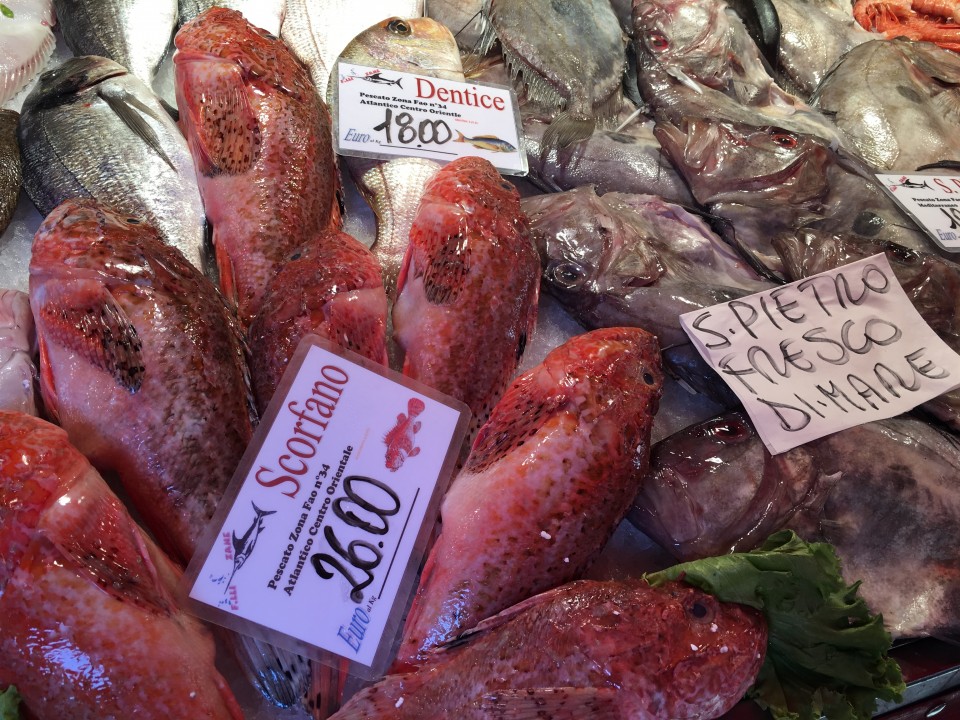
ACTIVITIES
To complement the academic experience, activities designed to introduce students to the local culture are planned. Past activities have included an introduction to Venetian rowing, introduction to wine cultivation and production and a wine tasting, a visit with Save Venice (a local conservation group), biking around the Lido, weekly group dinners, Italian conversation gatherings, museum tours, and sestieri tours.
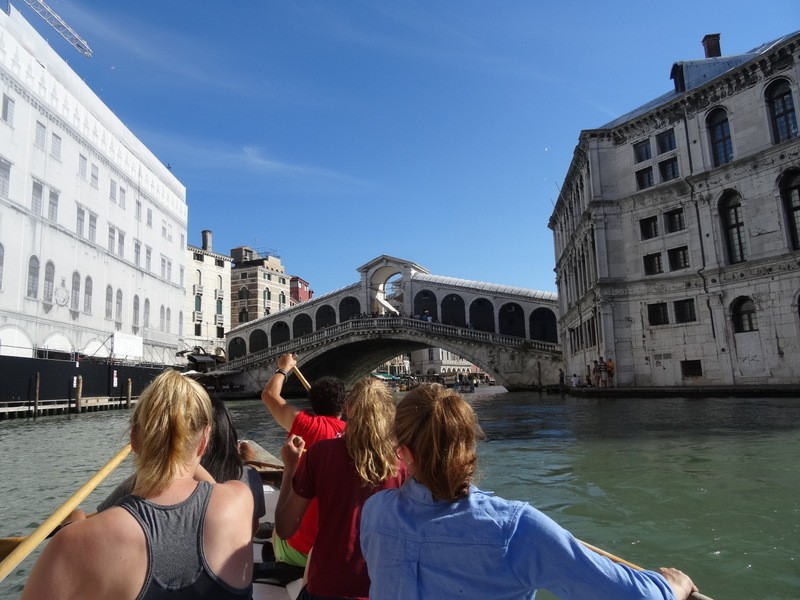
Field Trips
Regular field trips around the Veneto are scheduled as part of the academic program for the art history course and some trips and activities are incorporated into the Italian literature and culture course. Excursions have included an exploration of various Palladian villas, a day in Padova, and a trip to Verona.
DAILY LIVING AND SCHEDULE
This program has a very full schedule and students should expect to devote most of their time in Venice to the program and complementary activities. Classes are during the weekdays and so students are able to travel on the weekends if they choose to do so.
Summer in Venice is very hot and humid. Air conditioning is not common and will not be available in the apartments.
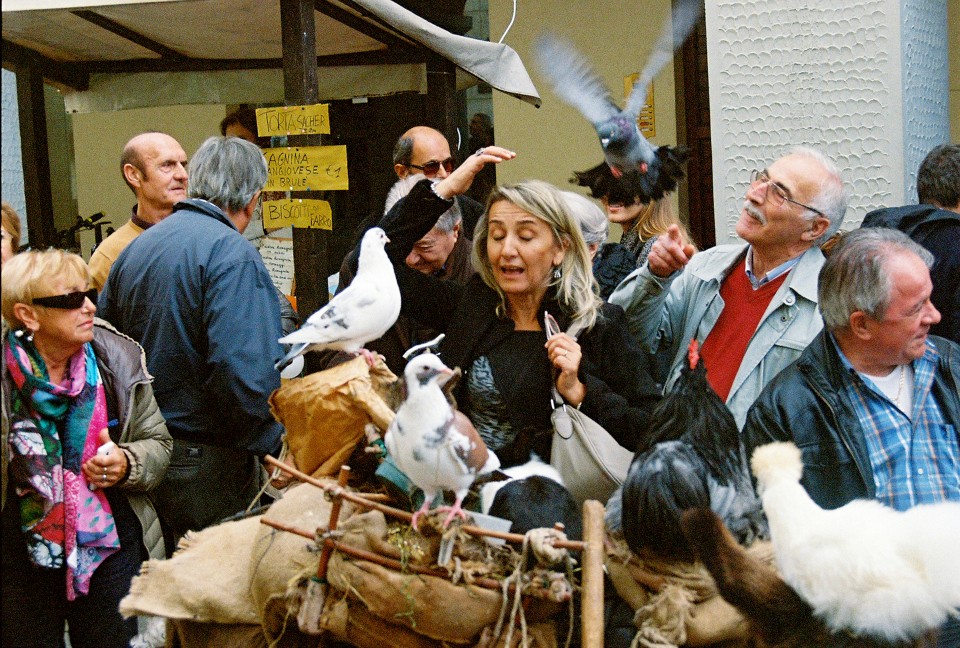
LOCATION
The program is based at Columbia's Casa Muraro: Research Center for Venetian Studies, located a few steps away from the Peggy Guggenheim Museum in Calle Barbaro, half way between the Gallerie dell’Accademia and the Punta della Dogana/Pinault Collection in Venice’s Dorsoduro quarter. Casa Muraro is the former home and library of the Venetian art historian Michelangelo “Mic” Muraro (1913–1991) and his wife, theater historian Maria Teresa Muraro, and was bequeathed to Columbia University in 2003 to honor the memory of Mic Muraro and to celebrate his life-long friendship with fellow art historian and Columbia Professor David Rosand (1938–2014).
Venice, Venezia in Italian, is considered by many the most beautiful city in the world. Founded over 1500 years ago, the Venetian Republic rose to become the main European center of trade between the East and West. At the height of its power, it controlled an empire that extended north to the Dolomites and south as far as Cyprus. This is where Marco Polo set off for his historic voyage to Italy.
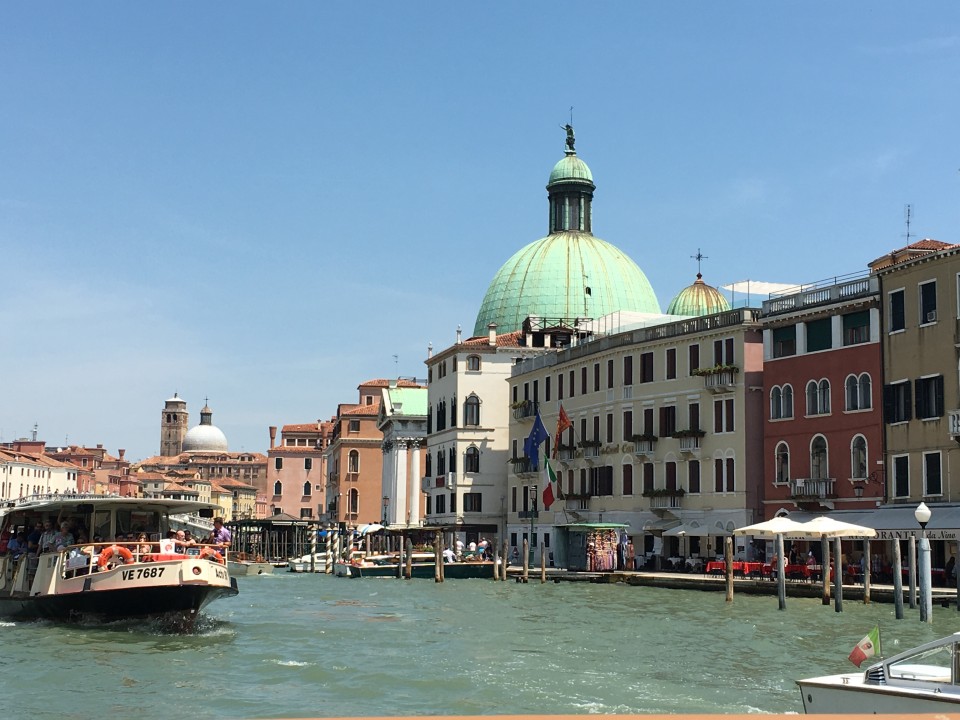
It is in a unique position, built on an archipelago of islets or shoals, a few kilometers from the mainland, in a lagoon protected from the open sea by the natural island of the Lido. The city is comprised of over 117 small islands, 150 canals, and more than 400 bridges. The buildings of Venice are either on natural islands or on piles of pine driven down about 7.5 meters beneath the water to a solid bed of compressed sand and clay. There are no cars; waterbuses, gondolas, and boats provide the only means of transport along a system, the main thoroughfare being the Grand Canal, lined with splendid palaces. Venice's urban fabric has not changed since the late eighteenth century, giving it a remarkably peaceful and enchanting atmosphere. One of the best ways to explore the city is to walk. It only takes one hour to get from east to west, enjoying the main attractions and discovering unique remnants of Venice's grand past in almost every corner.
People
FACULTY Summer 2026
Johanna Fassl (Instructor for Art in Venice) is an Associate Professor of Art History and Visual Communication and department chair at Franklin University Switzerland and served as the Resident Director of Casa Muraro from 2004–2014. She received her PhD (with distinction) from Columbia University and has since been the recipient of numerous fellowships, including a Mellon and Getty Postdoctoral Fellowship for her research. Her areas of specialization include the art and architecture of Venice; her book Sacred Eloquence: Giambattista Tiepolo and the Rhetoric of the Altarpiece was published with Peter Lang was in 2010.
Julia Bryan-Wilson (Instructor for Contemporary Art at the Venice Biennale) is Professor of Contemporary Art and LGBTQ+ Studies and core faculty in Columbia's Institute for the Study of Sexuality and Gender. Her research interests include feminist and queer theory, theories of artistic labor, performance and dance, production/fabrication, craft histories, photography, video, visual culture of the nuclear age, and collaborative practices. She is the author of four award-winning books, and a widely published critic. In 2024 she served as the President of the International Jury of the 60th Venice Biennale. She is a Curator-at-Large at the Museu de Arte de São Paulo (MASP), and was a Guggenheim Fellow in 2019.
Konstantina Zanou (Instructor for Mediterranean Humanities II in Venice) is Associate Professor of Italian, specializing in Mediterranean Studies, in the Italian Department at Columbia University. She is a historian of the long nineteenth century in the Mediterranean. Her research focuses on issues of intellectual and literary history, history of archaeology, nationalism, and biography, with a special emphasis on Italy and Greece. She is also a student of modern diasporas and of the trajectories and ideas of people on the move. Her book Transnational Patriotism in the Mediterranean, 1800-1850: Stammering the Nation (Oxford University Press 2018) won the 2019 Edmund Keeley Book Prize in Modern Greek Studies, the 2019 Marraro Prize in Italian History, and the 2020 Mediterranean Seminar Best Book Prize, and was translated into Italian and Greek. She has also co-edited the volume Mediterranean Diasporas: Politics and Ideas in the Long Nineteenth Century (Bloomsbury 2016). Her current book project, Sea of Antiquities: The Cesnola Brothers, the Global Mediterranean, and the Making of the Modern Museum, is forthcoming by Oxford University Press in 2026.
Mieke Van Molle (Instructor for Introduction to the Conservation of Venice's Built Heritage) performs varied research and consultancy activities in the field of stone conservation and cultural heritage including several related publications. She holds a MA degree in Archaeology and History of Art from the Catholic University of Leuven, Belgium, and specialized in conservation at ICCROM, the Istituto Centrale del Restauro, Rome and the Institut Royal du Patrimoine Artistique, Belgium. She has worked as a freelance conservator in Italy, Belgium and France, mainly in stone, stuccoes and mural paintings conservation. She collaborated with ICCROM from 1991 to 2009, coordinating the last five ICCROM-UNESCO Venice International Stone Conservation Courses (1997-2009). Additionally, she taught stone conservation at the Università Internazionale dell’Arte, Venice from 2001-2004. From 2005 to 2008 she was Head of the Permanent Office of the Association of International Private Committees for the Safeguarding of Venice, which included the coordination of conservation, research and cultural promotion projects financed by the Private Committees in the framework of the UNESCO-Private Committees Program for the Safeguarding of Venice, in close cooperation with the Superintendencies for the Care of Cultural Property.
FACULTY Summer 2025
Alexander Alberro (Instructor for Contemporary Art and Architecture at the Venice Biennale) is the Virginia Bloedel Wright Professor of Modern and Contemporary Art in the Departments of Art History at Barnard College and Columbia University. He has published widely on modern and contemporary art and theory. Selected book-length publications include Abstraction in Reverse (University of Chicago, 2017), Working Conditions (MIT Press, 2016); Museum Highlights (MIT Press, 2005); Conceptual Art and the Politics of Publicity (MIT Press, 2003); Recording Conceptual Art (University of California Press, 2001); and Conceptual Art: A Critical Anthology (MIT Press, 1999). His Interstices: At Contemporary Art’s Boundaries, which focuses on the negotiations at the margins between art frameworks, is forthcoming with the University of Chicago Press in 2025. Alberro has also published in various journals and exhibition catalogs and delivered many lectures internationally. In November 2023, he presented a keynote lecture at the international conference “Forum of Cultural Diplomacy” held at the United Nations in New York.
Johanna Fassl (Instructor for Art in Venice) is an Associate Professor of Art History and Visual Communication and department chair at Franklin University Switzerland and served as the Resident Director of Casa Muraro from 2004–2014. She received her PhD (with distinction) from Columbia University and has since been the recipient of numerous fellowships, including a Mellon and Getty Postdoctoral Fellowship for her research. Her areas of specialization include the art and architecture of Venice; her book Sacred Eloquence: Giambattista Tiepolo and the Rhetoric of the Altarpiece was published with Peter Lang was in 2010.
Giuseppe Gerbino (Instructor for Opera in Venice) joined the Columbia faculty in 2001. His research interests include the Italian madrigal, the relationship between music and language in the early modern period, early opera, and Renaissance theories of cognition and sense perception. He is the author of Canoni ad Enigmi: Pier Francesco Valentini e l'artificio canonico nella prima metà del Seicento (Rome, 1995), and Music and the Myth of Arcadia in Renaissance Italy (Cambridge, 2009), which won the 2010 Lewis Lockwood Award of the American Musicological Society. His publications have appeared in the Journal of Musicology, the Journal of Medieval and Early Modern Studies, The Musical Quarterly, Studi Musicali, and Il Saggiatore Musicale. He served on the Governing Board of the Columbia Society of Fellows in the Humanities and the Advisory Committee of the Harvard Center for Italian Renaissance Studies (Villa I Tatti). He is also the co-director of the Marenzio Online Digital Edition, which has been funded by a three-year grant from the National Endowment for the Humanities. In 2013 Columbia honored him with the Lenfest Distinguished Faculty Award. Prof. Gerbino chaired the Department from 2011 to 2014.
Konstantina Zanou (Instructor for Mediterranean Humanities II in Venice) is Associate Professor of Italian, specializing in Mediterranean Studies, in the Italian Department at Columbia University. She is a historian of the long nineteenth century in the Mediterranean. Her research focuses on issues of intellectual and literary history, history of archaeology, nationalism, and biography, with a special emphasis on Italy and Greece. She is also a student of modern diasporas and of the trajectories and ideas of people on the move. Her book Transnational Patriotism in the Mediterranean, 1800-1850: Stammering the Nation (Oxford University Press 2018) won the 2019 Edmund Keeley Book Prize in Modern Greek Studies, the 2019 Marraro Prize in Italian History, and the 2020 Mediterranean Seminar Best Book Prize, and was translated into Italian and Greek. She has also co-edited the volume Mediterranean Diasporas: Politics and Ideas in the Long Nineteenth Century (Bloomsbury 2016). Her current book project, Sea of Antiquities: The Cesnola Brothers, the Global Mediterranean, and the Making of the Modern Museum, is forthcoming by Oxford University Press in 2026.
STAFF
Beatrice Mazzi (Program Director) is a PhD candidate in Italian Studies and Comparative Literature and Society at Columbia University, where she expects to complete her degree in Spring 2025. Her research focuses on Italian contemporary literature, life stories, and testimony, with an interdisciplinary approach that also explores oral history, documentary, graphic novels, and gender theory.
Beatrice's academic journey is marked by a strong international and multilingual foundation. She earned her BA in Foreign Languages and Literatures at the University of Perugia, where she also completed an Erasmus-funded semester at the University of Sevilla (Spain). She holds an MA in Literary Translation from the University of Turin and a Master of Arts in Comparative Literature from University College London, both earned in 2010. In Spring 2020 Beatrice also spent a semester as a visiting scholar at Utrecht University, further expanding her international academic experience.
Her professional experience spans both academia and international education. Beatrice has a long-standing connection with the Columbia in Venice Summer Program, where she previously served as an Italian language instructor and program coordinator. Before joining Columbia, she worked as a language instructor for several American study abroad programs in Florence and as Programs Coordinator at the International Center of the University of Oklahoma. Since Fall 2022, she has been teaching Italian and Comparative Literature at Franklin University in Lugano, Switzerland. In her current role as Program Manager of Casa Muraro, she is working to enhance cultural and academic programming, fostering deeper engagement with Italian culture and with Venetian studies. Beatrice is passionate about leveraging her international background and extensive knowledge of Italian culture to create meaningful, transformative study abroad experiences for her students.
Financial Considerations
Program Costs
*Summer 2026 Tuition and Fees
Please see our cost breakdown for detailed information.
*Tuition and fees are subject to the Board of Trustees' approval and may change.
FINANCIAL AID AND SCHOLARSHIPS
If you receive financial aid during the academic year, you may remain eligible for financial aid when you attend a summer Columbia-Led Program as long as you take a minimum of 6 points.
CC/SEAS: Contact the CC/SEAS Financial Aid & Educational Planning to understand if any of your federal financial aid may cover enrollment costs for a summer program. Please note the Columbia Grant is not available for summer studies.
General Studies: Contact the GS Office of Educational Financing to understand if any of your financial aid may cover participation in a summer program.
For more general information and resources on financing your time abroad, please see the pages below:
Other students should contact their home school financial aid offices.
Funding Your Summer in Venice
FINLEY FELLOWSHIP FOR VENETIAN STUDIES
Thanks to the generosity of Carol and John Finley, this competitive summer fellowship supports undergraduate students participating in Columbia University’s Venice Summer Program. The Finley Fellowship for Venetian Studies consists of a stipend to help defray the costs for airfare and out-of-pocket expenses associated with the summer program. Award amounts can vary depending on the number of successful applicants, but are typically between $1,500 and $2,500 per awardee. For Eligibility and Application Procedures please see the Finley Fellowship information here: https://casamuraro.columbia.edu/grants.
GLOBAL LEARNING SCHOLARSHIPS
The Center for Undergraduate Global Engagement (UGE) offers the Global Learning Scholarship (GLS) to support Columbia students so they may enhance their undergraduate education by participating in a summer global learning opportunity.
GLS Eligibility:
You are eligible for the Global Learning Scholarships (GLS) if you are:
A Columbia College, Columbia Engineering, or General Studies student who demonstrates financial need
All other students are not eligible for the GLS
GLS Application and Timeline:
Students apply for the Global Learning Scholarship (GLS) and the Columbia-Led summer program with two separate applications.
Scholarship applications are due: Friday, February 13th, 2026 (closes at 11:59 PM EST)
GLS applicants must also submit a completed program application by the program application deadline OR no later than the following: Friday, February 13th, 2026 (closes at 11:59 PM EST)
To apply to the Global Learning Scholarship (GLS), please click here.
OTHER SCHOLARSHIPS
For a list of other scholarships specific to study abroad, please visit the Scholarships for Study Abroad for more information. Of note are the:
Withdrawal Policy
To learn about the financial consequences for withdrawing from the program, please read the Summer Withdrawal and Refund Policy here.
Find Out More
Learn more about the Venice program from the Resident Director, instructors and program staff. Please enjoy a recording of our December 2024 information session for our 2025 program:
Speak to an Adviser: Want to learn more? Make an appointment to chat with the adviser for this program! You can also email them with any questions or to arrange a meeting if you are unable to make the listed times.
Applying: Make sure to review the dates and deadlines section at the bottom of the page.
Resources: View our Steps to Study Abroad page to see advice on Where to Begin, how to Prepare to Go, and what you need to know when Returning from Abroad. We will share many resources with you throughout the application and pre-departure process for preparing to study abroad.
We recommend reviewing the following before you apply:
Having a valid passport is one of the key components of going abroad. See more on our Passports and Visas page.
Need help deciding which semester, program, and experience are right for you? Check out our Choosing a Study Abroad Program page.
Learn about finances and study abroad on our Financial Considerations page.
If considering summer study abroad, review guidance on our Summer Study Abroad page.
Plan ahead and prepare for your health, well-being, and accessibility abroad by reviewing our Well-Being Abroad resources and Identity and Diversity Abroad page.
Once accepted, make sure to review the Prepare to Go page for more resources and information about preparing for your experience abroad.
